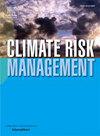What it means to be resilient to heatwaves for vulnerable households in mass tourist destinations?
IF 5
2区 环境科学与生态学
Q1 ENVIRONMENTAL SCIENCES
引用次数: 0
Abstract
Despite clear evidence of increasing heatwaves in the Mediterranean region, coastal cities in Spain are often reluctant to recognize these events as significant risks, largely due to the economic benefits a warm climate brings to their tourism industry. This reluctance exists despite the fact that many residents in these cities, particularly those working in tourism, face economic hardship due to the precarious nature of the sector. Our research focuses on Lloret de Mar, Catalonia, to examine the impacts of heatwaves in vulnerable households. We analyze the vulnerability and resilience of these households to extreme heat events and heatwaves by studying lived experiences identifying their coping strategies and the barriers they face. To gather data, we conducted 28 interviews and participatory mapping exercises with users of a food distribution center run by Caritas. Participants frequently reported experiences of extreme discomfort at home, describing symptoms such as exhaustion, suffocation, and excessive sweating, exacerbated by high humidity levels. The study found that participants have limited coping mechanisms, relying mainly on natural ventilation and fans. Some are constrained to staying at home due to economic challenges, with no opportunity to use vacation as a respite. The participatory mapping further revealed that these households are regularly exposed to heat during their daily activities. In the absence of effective municipal or collective adaptation strategies, vulnerable households remain entrapped in increasingly unlivable conditions. Our findings underscore the urgent need for localized adaptation plans that address the specific needs of the community, especially given the current municipal policies that are heavily focused on sustaining the tourism industry.
对于大众旅游目的地的脆弱家庭来说,抵御热浪意味着什么?
尽管有明确的证据表明地中海地区的热浪越来越多,但西班牙的沿海城市往往不愿意将这些事件视为重大风险,这主要是由于温暖的气候给其旅游业带来的经济利益。尽管这些城市的许多居民,特别是从事旅游业的居民,由于该部门的不稳定性质而面临经济困难,但这种不情愿仍然存在。我们的研究重点是加泰罗尼亚的Lloret de Mar,以检查热浪对脆弱家庭的影响。通过研究这些家庭的生活经历,确定他们的应对策略和面临的障碍,我们分析了这些家庭对极端高温事件和热浪的脆弱性和复原力。为了收集数据,我们与明爱经营的食品配送中心的用户进行了28次访谈和参与式测绘活动。参与者经常报告在家中极度不适的经历,描述了疲惫、窒息和过度出汗等症状,高湿度加剧了这些症状。研究发现,参与者的应对机制有限,主要依靠自然通风和风扇。由于经济困难,一些人被迫呆在家里,没有机会利用假期来喘息。参与式测绘进一步显示,这些家庭在日常活动中经常暴露在高温下。在缺乏有效的市政或集体适应战略的情况下,脆弱家庭仍然处于日益不适宜居住的环境中。我们的研究结果强调,迫切需要制定本地化的适应计划,以满足社区的具体需求,特别是考虑到当前的市政政策主要侧重于维持旅游业。
本文章由计算机程序翻译,如有差异,请以英文原文为准。
求助全文
约1分钟内获得全文
求助全文
来源期刊

Climate Risk Management
Earth and Planetary Sciences-Atmospheric Science
CiteScore
8.20
自引率
4.50%
发文量
76
审稿时长
30 weeks
期刊介绍:
Climate Risk Management publishes original scientific contributions, state-of-the-art reviews and reports of practical experience on the use of knowledge and information regarding the consequences of climate variability and climate change in decision and policy making on climate change responses from the near- to long-term.
The concept of climate risk management refers to activities and methods that are used by individuals, organizations, and institutions to facilitate climate-resilient decision-making. Its objective is to promote sustainable development by maximizing the beneficial impacts of climate change responses and minimizing negative impacts across the full spectrum of geographies and sectors that are potentially affected by the changing climate.
 求助内容:
求助内容: 应助结果提醒方式:
应助结果提醒方式:


